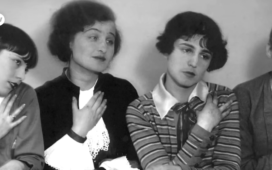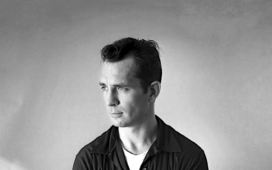Had Andy Warhol lived to see the internet–especially social networking–he would have loved it, though it may not have loved him. Though Warhol did see the very beginnings of the PC revolution, and made computer art near the end of his life on a Commodore Amiga 1000, he was mostly enamored, unsurprisingly, of TV. “I love television,” he once remarked, “It is the medium I’d most like to shine in. I’m really jealous of everybody who’s got their own show on television. I want a show of my own.”
Warhol realized his dream in 1979, though in a venue that may not have lived up to his fantasies: a New York public-access channel called Manhattan Cable, “which showed local sports matches and agreed to sell 30-minute slots to Warhol for around $75 a pop,” notes The Telegraph. Warhol made a total of 42 episodes of his odd interview show. The pop art impresario “wasn’t exactly a natural… when it came to the delicate art of chat-show hosting,” but “he didn’t let that stop him.” By 1983, one might have thought he’d have gotten the hang of it, yet he seems especially awkward when cranky prog genius Frank Zappa appeared on his show that year.
Luckily for Warhol, he is joined by Zappa fan Richard Berlin, who serves as a buffer between the two superstars. (Berlin is probably the son of William Randolph Hearst’s handpicked successor, whose daughter, Brigid, was one of Warhol’s film stars.) At least in the excerpt above, Berlin does all of the work while Warhol looks on, seemingly stupefied. But the truth is that Warhol hated Zappa, and after the interview, he wrote in his Diaries, “I hated Zappa even more than when it started.” Part of what the show’s ostensible host found so objectionable was Zappa’s egomaniacal personality. Though Warhol, like Zappa, controlled his own small independent empire, in temperament, the two couldn’t have been more different.
But there was also some personal history between them that went back to the earliest days of the Velvet Underground. “I remember,” Warhol goes on, “when he was so mean to us when the Mothers of Invention played with the Velvet Underground—I think both at the trip, in L.A., and at the Fillmore in San Francisco. I hated him then and I still don’t like him.” Zappa wasn’t simply rude, however; at a 1967 show in New York, he turned his talent for ridicule into what Kaleidoscope magazine writer Chris Darrow called “one of the greatest pieces of rock’n roll theater that I have ever seen.”
The opening night was very crowded and Zappa and members of the Mothers of Invention showed up to show their support. (…) Nico’s delivery of her material was very flat, deadpan, and expressionless, and she played as though all of her songs were dirges. She seemed as though she was trying to resurrect the ennui and decadence of Weimar, pre-Hitler Germany. Her icy, Nordic image also added to the detachment of her delivery. (…) The audience was on her side, as she was in her element and the Warhol contingent was very prominent that night. However, what happened next is what sticks in my mind the most from that night. In between sets, Frank Zappa got up from his seat and walked up on the stage and sat behind the keyboard of Nico’s B‑3 organ. He proceeded to place his hands indiscriminately on the keyboard in a total, atonal fashion and screamed at the top of his lungs, doing a caricature of Nico’s set, the one he had just seen. The words to his impromptu song were the names of vegetables like broccoli, cabbage, asparagus… This “song” kept going for about a minute or so and then suddenly stopped. He walked off the stage and the show moved on.
What Warhol took personally may have just been the irrepressible outgrowth of Zappa’s disdain for virtually everything, which he expresses to Berlin in the interview. Original Mothers of Invention drummer Jimmy Carl Black speculated that he may have hated the Velvet Underground because “they were junkies and Frank just couldn’t tolerate any kind of drugs.” The two bands were also, briefly, competitors at MGM.
But perhaps Zappa just couldn’t tolerate anyone else taking the spotlight, especially a talented female performer. Warhol remembers Zappa’s response to a compliment about his daughter, Moon. “Listen,” he supposedly told Warhol, “I created her. I invented her.… She’s nothing. It’s all me.” In contrast to the “peculiar” reply, Warhol writes “if it were my daughter I would be saying ‘Gee, she’s so smart,’ but he’s taking all the credit.” Zappa may have been a musical genius with a special entrepreneurial flair and incisive critical wit, but the “sexist autocrat… with a scabrous attitude,” as Carlo Wolff describes him, “was not a likeable man.” Certainly the mild-mannered Warhol didn’t think so.
Related Content:
Andy Warhol Digitally Paints Debbie Harry with the Amiga 1000 Computer (1985)
Frank Zappa’s 1980s Appearances on The David Letterman Show
When Andy Warhol Guest-Starred on The Love Boat (1985)
Josh Jones is a writer and musician based in Durham, NC. Follow him at @jdmagness















